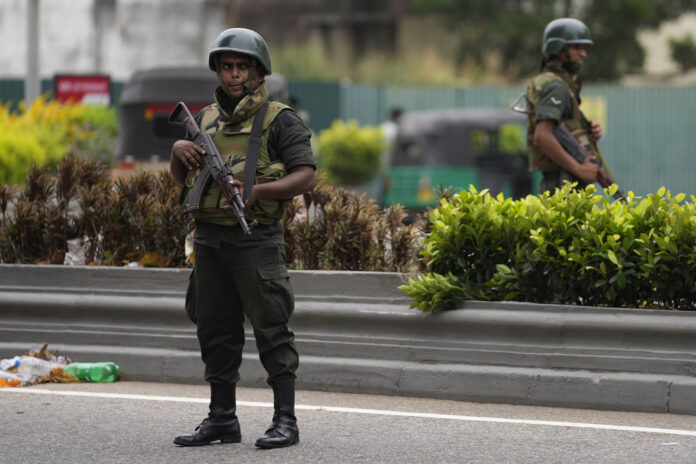Sri Lanka gave emergency powers on Tuesday to its military and police to detain people without warrants, after a day of clashes that killed seven people and injured more than 200, in violence that prompted Prime Minister Mahinda Rajapaksa to resign.
As the Indian Ocean nation battles its worst economic crisis in history, thousands of protesters had defied curfew to attack government figures, setting ablaze homes, shops and businesses belonging to ruling party lawmakers and provincial politicians.
Despite sporadic reports of unrest, the situation calmed by Tuesday, said police spokesman Nihal Thalduwa, adding that about 200 people had also been injured in violence that led to an islandwide curfew until 7:00 a.m. (0130 GMT) the following day.
The government of President Gotabaya Rajapaksa, the younger brother of the prime minister, outlined broad powers for the military and police to detain and question people without arrest warrants.
The military can detain people for up to 24 hours before handing them to police, while private property can be searched by force, including private vehicles, the government said in a gazette notification on Tuesday.
Sri Lankan soldiers stand guard next to burnt buses a day after clashes between government supporters and anti-government protesters in Colombo, Sri Lanka, Tuesday, May 10, 2022.
AP Photo/Eranga Jayawardena
An elephant decides to check out a hotel in Sri Lanka – Jan 21, 2020
“Any person arrested by a police officer shall be taken to the nearest police station,” it said, fixing a 24-hour deadline for the armed forces to do the same.
Trending Stories
COVID-19 pandemic has seen surgery delays persist in Canada, new study shows
Eye drops recalled due to labelling error, Health Canada says
Some analysts expressed concern over the potential for abuse of the emergency measures.
“In a situation where there is both a state of emergency and curfew who can monitor to ensure these regulations are not abused?” said Bhavani Fonseka, of the Centre for Policy Alternatives think tank based in Colombo.
The president had already declared a state of emergency on Friday as protests escalated.
A Sri Lankan government supporter carries a national flag after attacking the anti government protest site outside president’s office in Colombo, Sri Lanka, Monday, May 9, 2022.
AP Photo/Eranga Jayawardena
The attacks on government figures came in apparent reprisal for an incident just hours before Rajapaksa’s resignation.
Rajapaksa spoke to hundreds of supporters gathered at his official residence on Monday following reports that he was considering stepping down.
After his remarks, many of them, armed with iron bars, stormed a camp of those protesting against the government, beating them and setting fire to their tents.
Police fired water cannons and tear gas to disperse the skirmishers, after having initially done little to hold back the government supporters, according to Reuters witnesses.
Thousands streamed into the streets in celebration after Rajapaksa’s resignation, but the mood quickly became tense.
Protesters attempted to tear down the gates of Temple Trees, his residence in the center of Colombo, where broken glass and discarded footwear littered the surrounding streets on Tuesday, after some of the night’s worst clashes.
Military troops patrolled the area, where eight torched vehicles lay partially submerged in a lake. Discarded files and smashed equipment littered the ransacked offices of government officials.
Sri Lanka’s pro government and anti government protestors clash as police fires water canons outside the president’s office in Colombo, Sri Lanka, Monday, May 9, 2022.
AP Photo/Eranga Jayawardena
Sri Lanka’s unprecedented economic crisis follows a pandemic that hit key tourism earnings, leaving the government grappling with rising oil prices and the impact of populist tax cuts.
It has sought assistance from multilateral lenders such as the World Bank and the International Monetary Fund, as well as Asian giants India and China.
Former finance minister Ali Sabry, who resigned on Monday, along with the rest of Rajapaksa’s cabinet, has said useable foreign reserves stand at as little as $50 million.
Shortages of fuel, food and medicine have brought thousands onto the streets in more than a month of protests that had been mostly peaceful until this week.
© 2022 Reuters



